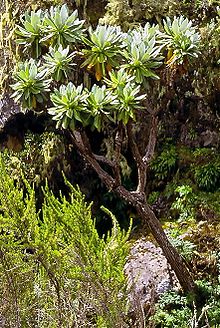
Senecio is a genus of flowering plants in the daisy family (Asteraceae) that includes ragworts and groundsels.
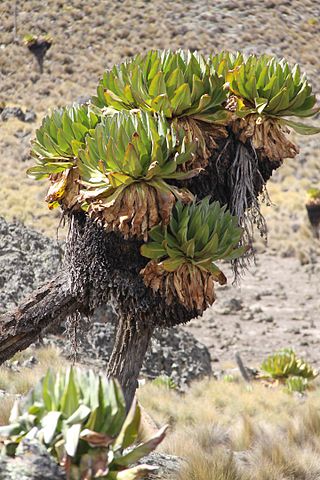
Dendrosenecio keniodendron or giant groundsel is a species of the genus Dendrosenecio of the large family Asteraceae and is one of the several species of giant groundsels endemic to the high altitudes of the Afrotropics, including Dendrosenecio johnstonii (Senecio battiscombei) occurring on Mount Kilimanjaro, Mount Kenya, and the Aberdare Mountains, Dendrosenecio keniensis occurring the lower alpine zone of Mount Kenya and D. keniodendron occurring in higher and drier sites on Mount Kenya. The giant rosette plants, sometimes 6 metres (20 ft) tall, often grow in even-sized stands, with different understory communities under different-aged stands.
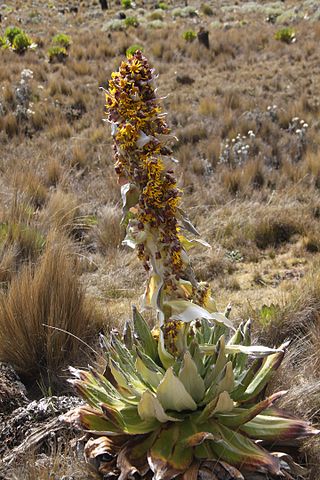
Dendrosenecio keniensis is one of the giant groundsels endemic the higher altitudes of Mount Kenya. It is in the family Asteraceae and the genus Dendrosenecio. Dendrosenecio keniodendron occurs the upper alpine zone of Mount Kenya and D. keniensis in the wetter areas of the lower alpine or the moorlands.
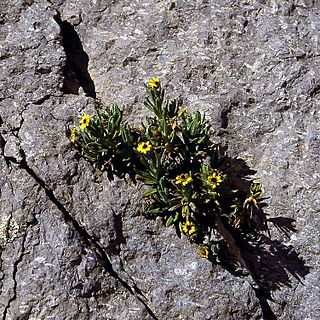
Atop of Mount Kenya Senecio keniophytum is one of the endemic groundsel (Senecio) found at high altitudes in Kenya, such as the Afro-alpine zone of Mount Kenya, but not one of the giant Dendrosenecio that also live there.

Aneilema is a genus of monocotyledonous plants of approximately 60 species. The vast majority of the species are native to sub-Saharan Africa, but a few are found in Oceania and one, Aneilema brasiliense, is from South America. It is the third largest genus in the family Commelinaceae after Commelina and Tradescantia, and it is one of only six genera in the family to occur in both the Eastern Hemisphere and the Western Hemisphere.

Dendrosenecio is a genus of flowering plants in the sunflower family. It is a segregate of Senecio, in which it formed the subgenus Dendrosenecio. Its members, the giant groundsels, are native to the higher altitude zones of ten mountain groups in equatorial East Africa, where they form a conspicuous element of the flora.
Dendrosenecio meruensis is one of the East African giant groundsel, this one is endemic to the slopes of Mount Meru. Once they were considered to be of the genus Senecio but since then have been reclassified into their own genus Dendrosenecio.
Dendrosenecio cheranganiensis is one of the East African giant groundsel, this one endemic to the Cherangani Hills. Once it was a genus of Senecio but has recently been reclassified as a Dendrosenecio.
Dendrosenecio elgonensis is one of the giant groundsel of East Africa; this one is endemic to Mount Elgon. They used to be considered part of the genus Senecio but recently have been reclassified to their own genus, Dendrosenecio.
Dendrosenecio erici-rosenii one of the East African giant groundsel and this one can be found on the Rwenzori Mountains, Virunga Mountains and the Mitumba Mountains. It is a species of the genus Dendrosenecio and is also a collection of reclassified Senecio species.

Dendrosenecio kilimanjari is a giant groundsel found on Mount Kilimanjaro in Africa, below 4,000 metres (13,000 ft).
Dendrosenecio johnstonii, formerly Senecio johnstonii, is a species of giant groundsel found in the middle altitudes of Mount Kilimanjaro in Africa. A recent botanical reclassification split off some species formerly in Senecio, putting the giant groundsels in the new genus Dendrosenecio. It also redefined the former species Senecio cottonii, as a subspecies of Dendrosenecio johnstonii. Both genera are in the family Asteraceae. The giant grounsels of the genus Dendrosenecio evolved, about a million years ago, from a Senecio that established itself on Mount Kilimanjaro, with those that survived adapting into Dendrosenecio kilimanjari. As it moved down the mountain, the adaptations necessary for the new environment created the new species, Dendrosenecio johnstonii. Various subspecies are found on other mountains.
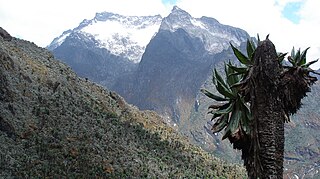
Dendrosenecio adnivalis is one of the giant groundsels of the mountains of Eastern Africa. D. adnivalis grows on the Rwenzori Mountains and on the Virunga Mountains in Uganda and the Democratic Republic of Congo.
Dendrosenecio brassiciformis is one of the East African giant groundsel, this one is endemic to the slopes of Aberdare Range and bearing fruit but once, and dying after. Once considered to be of the genus Senecio but since have been reclassified into their own genus Dendrosenecio.

The flora and fauna of Mount Kenya are diverse, due to the variation in altitude, rainfall, aspect and temperature. The mountain slopes can be divided into vegetation zones, with each zone having different dominant plant species. Although many plants on Mount Kenya have local names, here they are reported only with their English and scientific names.

Phaneroglossa is a genus of plants that is assigned to the daisy family. It consists of only one species, Phaneroglossa bolusii, a perennial plant of up to 40 cm high, that has leathery, line- to lance-shaped, seated leaves with mostly few shallow teeth and flower heads set individually on top of long stalks. The flower head has an involucre of just one whorl of bracts, few elliptic, white or cream ray florets, and many yellow disc florets. It is an endemic species of the Western Cape province of South Africa. Flowering mainly occurs from November to January.

Cherangani Hills Forest is a collection of thirteen forest reserve blocks in western Kenya, located in the Cherangani Hills on the western ridge of the East African Rift. The forested area is about 1,200 square kilometres (463 sq mi), 956 square kilometres (369 sq mi) of which has been gazetted into forest reserves. These forest reserves form the upper catchments of the Kerio and Nzoia and Turkwel rivers.

The Ruwenzori-Virunga montane moorlands is a montane grasslands and shrublands ecoregion of the Rwenzori Mountains and Virunga Mountains in central Africa.

Carex monostachya is a species of sedge native to the mountains of East Africa.
